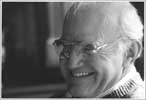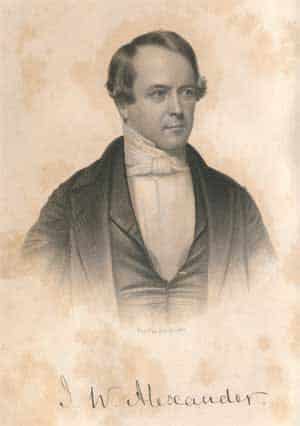“A nail driven in a sure place.”
William Miller Paxton is another of those names that seems now forgotten to the modern ear. He was notably a pastor in Pittsburgh, then a professor of homiletics (preaching), first at Western Theological Seminary, also in Pittsburgh, and later at the Princeton Theological Seminary, with a pastorate in New York City falling between those two appointments. His grandfather, the Rev. Dr. William Paxton, was also a noted pastor, who was born on April 1, 1760 and who died on April 16, 1845. But in researching the extended family, I was intrigued by this account and so am posting here today an account of the grandson, rather than the grandfather. The full account, and more, can be read here, but in abbreviated form and touching on just a few of the significant events in Dr. Paxton’s life, here is a portion of the eulogy given by Dr. Benjamin B. Warfield for his friend and colleague:—
 William Miller Paxton was descended from a godly ancestry of thoroughly Presbyterian traditions…The earliest of his paternal ancestors who has been certainly traced—the fourth in ascent from him—is found a little before the middle of the eighteenth century living in Bart township, Lancaster county, Pennsylvania, in a Scotch-Irish community which worshiped at Middle Octorara Church. The only son of this founder of the family served as an elder in that church; and out of it came his son, Dr. Paxton’s grandfather, the Rev. Dr. William Paxton, who, after having like his father before him fought in the Revolutionary War for the liberties of his country, enlisted as a soldier of Christ in the never-ceasing conflict for righteousness. Crossing the Susquehanna, he was settled in 1792 as pastor of Lower Marsh Creek church, in what is now Adams county, Pennsylvania, and there fulfilled a notable ministry of half a century’s duration.
William Miller Paxton was descended from a godly ancestry of thoroughly Presbyterian traditions…The earliest of his paternal ancestors who has been certainly traced—the fourth in ascent from him—is found a little before the middle of the eighteenth century living in Bart township, Lancaster county, Pennsylvania, in a Scotch-Irish community which worshiped at Middle Octorara Church. The only son of this founder of the family served as an elder in that church; and out of it came his son, Dr. Paxton’s grandfather, the Rev. Dr. William Paxton, who, after having like his father before him fought in the Revolutionary War for the liberties of his country, enlisted as a soldier of Christ in the never-ceasing conflict for righteousness. Crossing the Susquehanna, he was settled in 1792 as pastor of Lower Marsh Creek church, in what is now Adams county, Pennsylvania, and there fulfilled a notable ministry of half a century’s duration.
Dr. Paxton’s father, Colonel James Dunlop Paxton, was a man of intelligence and enterprise, of fine presence and large influence in the community, engaged in the manufacture of iron, first at Maria Furnace, and later near Gettysburg and Chambersburg. It was at Maria Furnace that William Miller Paxton was born, on the seventh day of June, 1824. His youth was passed mostly at Gettysburg…his collegiate training at Pennsylvania College. He began the study of law, [but] united on profession of faith with the Falling Spring Presbyterian Church at Chambersburg, in March, 1845, …[and] Not more than a month after uniting with the church, on April 9th, 1845, he was received under the care of the Presbytery of Carlisle as a candidate for the ministry, and in the ensuing autumn he repaired to Princeton for his theological training.
…”I well remember,” he has told us himself, “that when I was a student, no young man could pass through his first year without being constrained to reexamine his personal hope and motives for seeking the sacred office.” No doubt this is primarily an encomium upon the pungency of the religious training of those four great men under whose instruction he sat—Drs. Archibald Alexander and Samuel Miller, Drs. Charles Hodge and Addison Alexander….One of the things Dr. Paxton always congratulated himself upon was that he had had a double training in theology. “The class to which I belonged,” he tells us, “heard” Dr. Archibald Alexander’s “lectures upon Didactic Theology as well as those of Dr. Hodge. Dr. Hodge gave us a subject with massive learning, in its logical development, in its beautiful balance and connection with the whole system. Dr. Alexander would take the same subject and smite it with a javelin, and let the light through it. His aim was to make one point and nail it fast. I always came from a lecture with these words ringing through my mind, “A nail driven in a sure place.”
…The greatest ecclesiastical event which occurred during Dr. Paxton’s New York ministry was, of course, the reunion of the Old and New School branches of the Church. He was of the number of those who did not look with satisfaction on the movement for union. Oddly enough, however, as a member of the Assembly of 1862, when corresponding delegates to the New School body were for the first time appointed, and of that of 1870, when the consummated union was set upon its feet, he was an active factor in both the beginning and end of the movement…When once the union was accomplished, he became one of the chief agents in adjusting the relations of the two long separated bodies.
…In 1883 he came to Princeton to take up the work of the chair of Ecclesiastical, Homiletical and Pastoral Theology, made vacant by the resignation of Dr. McGill. His church, which had grown steadily under his hands from 257 members to 409 in 1883, and whose affection for its pastor had grown with the years, was loath to give him up.
Words to Live By:
Dr. Warfield continued in his eulogy for Paxton, with a message that was close to Warfield’s own heart:—
…what he took his real stand upon was the perfectly sound position that our theological seminaries are primarily training-schools for ministers, and must be kept fundamentally true to this their proper work.
From this point of view he was never weary of warning those who were charged with the administration of these institutions against permitting them to degenerate into mere schools of dry-as-dust and, from the spiritual standpoint, useless learning. A very fair example of his habitual modes of thought and speech on this subject may be read in the charge which he delivered to his life-long friend, Dr. A.A. Hodge—whom he loved as a brother and admired as a saint of God—when Dr. Hodge was inaugurated as professor in this seminary. Permitting himself greater freedom, doubtless, because he knew he was addressing one sympathetic to his contentions, he becomes in this address almost fierce in his denunciations of a scholastic conception of theological training, and insistent to the point of menace in his assertion of the higher duty of the theological instructor. Pointing to the seminary buildings—he was speaking in the First Church—he exclaimed: “There stands that venerable institution. What does it mean? What is the idea it expresses? . . . Is it a place where young men get a profession by which they are to make their living? Is it a school in which a company of educated young men are gathered to grind out theology, to dig Hebrew roots, to read patristic literature, to become proficients in ecclesiastical dialects, to master the mystic techniques of the schoolmen, and to debate about fate, free-will, and the divine decrees? If this is its purpose, or its chief purpose, then bring the torch and burn it! . . . We do not in any way deprecate a learned ministry. We must have learning . . . .But whenever in a theological seminary learning takes the precedence, it covers as with an icicle the very truths which God designed to warm and melt the hearts of men. . . .No, no, this is not the meaning of a theological seminary . . .It is a school of learning, but it is also a cradle of piety!”
 It was only a year before that Archibald Alexander had been taken under care of the Presbytery of Lexington, Virginia. He was young and extremely small in stature. In our day, such a move of spiritual oversight is usually granted by a Presbytery after it has heard your personal testimony, what God has done for you in Christ in your spiritual life, and an expression of your call to the ministry. In the eighteenth century however, it included all that, no doubt, and also a sermon preached over the presbytery.
It was only a year before that Archibald Alexander had been taken under care of the Presbytery of Lexington, Virginia. He was young and extremely small in stature. In our day, such a move of spiritual oversight is usually granted by a Presbytery after it has heard your personal testimony, what God has done for you in Christ in your spiritual life, and an expression of your call to the ministry. In the eighteenth century however, it included all that, no doubt, and also a sermon preached over the presbytery.






